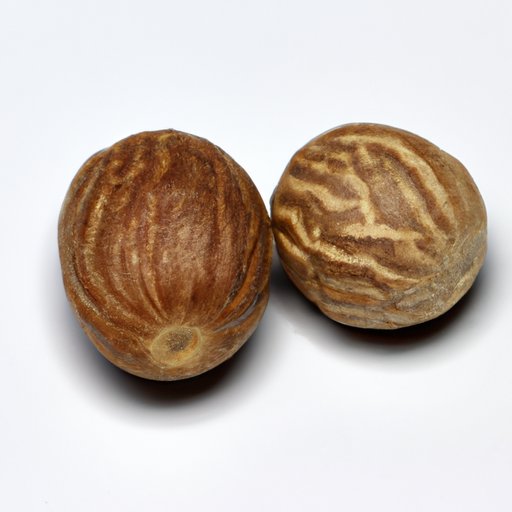
Can Nutmeg Get You High?
Do you have a jar of nutmeg sitting in your pantry? This humble spice has been used for centuries as a flavoring agent, but did you know that consuming large amounts of it can produce a high? Nutmeg is one of the many psychoactive substances that can be found in your kitchen, but it comes with risks that you need to be aware of. In this article, we will explore the history and cultural significance of nutmeg, analyze the potential side effects and health risks of consuming large amounts of nutmeg, address common misconceptions and myths about nutmeg’s effects, compare and contrast nutmeg’s effects with those of marijuana and other controlled substances, and provide resources for individuals who may be struggling with substance abuse related to nutmeg or other psychoactive substances.
The History and Cultural Significance of Nutmeg
Nutmeg is a spice that is derived from the seed of a tree found in Indonesia, and it has been used in spice blends and culinary dishes for thousands of years. It was considered a luxury item in Europe during the Middle Ages and was valued for its medicinal properties. Nutmeg was also used as a form of currency, and its trade was controlled by the Dutch East India Company.
The chemical compound in nutmeg that produces a high when consumed in large amounts is myristicin, which affects the central nervous system. Myristicin can produce hallucinations, feelings of euphoria, and a distorted sense of time.
Risks Associated with Consuming Large Amounts of Nutmeg
While nutmeg is not a controlled substance in most countries, consuming large amounts of it can lead to serious side effects and health risks. Some of the potential side effects of consuming large amounts of nutmeg include nausea, vomiting, dizziness, rapid heartbeat, dry mouth, numbness, and even seizures. In some cases, nutmeg consumption has led to hospitalization.
In addition to the physical side effects, consuming large amounts of nutmeg can also have a negative impact on mental health. Nutmeg can produce feelings of anxiety, paranoia, and panic, and these effects can last for several days. Nutmeg consumption has also been linked to psychosis and other mental health disorders.
There have been reports of individuals experiencing the negative effects of nutmeg consumption after experimenting with it as a psychoactive substance. In one case, a teenager consumed six tablespoons of nutmeg and ended up in the hospital with symptoms of overdose. This is just one example of the dangers associated with consuming large amounts of nutmeg.
Misunderstandings and Myths about the Effects of Nutmeg
There are many misunderstandings and myths surrounding the effects of nutmeg as a psychoactive substance. One of the most common misconceptions is that nutmeg is a natural and safe alternative to other controlled substances, such as marijuana. This is simply not true. Nutmeg is a powerful psychoactive substance that can produce serious side effects and health risks.
Another myth is that nutmeg is a hallucinogen, which means that it can produce vivid visual and auditory hallucinations. While it is true that nutmeg can produce some hallucinogenic effects, it is not classified as a hallucinogen. Instead, nutmeg is classified as a deliriant, which means that it can produce confusion, disorientation, and an altered state of consciousness.
Comparison and Contrast with Other Controlled Substances
When comparing and contrasting nutmeg’s effects with those of other controlled substances, it is important to note that nutmeg is not regulated in the same way as other substances. Marijuana, for example, is classified as a Schedule I drug in the United States, which means that it is considered to have no medical use and a high potential for abuse. Nutmeg, on the other hand, is not classified as a controlled substance, even though it can produce a high and has potential health risks.
While nutmeg and marijuana share some similarities in their effects, there are also significant differences. Marijuana is known for its calming and relaxing effects, while nutmeg can produce feelings of anxiety and paranoia. Additionally, the effects of marijuana are usually short-lived, lasting only a few hours, while the effects of nutmeg can last for several days.
Personal Story or Narrative
One individual who experimented with nutmeg as a psychoactive substance described the experience as “terrifying.” They consumed a large amount of nutmeg and experienced intense anxiety and paranoia, as well as vivid hallucinations. The effects lasted for several days, and they ended up seeking medical help.
This story highlights the dangers associated with experimenting with nutmeg as a psychoactive substance. While it may be tempting to try nutmeg as a natural and legal high, the risks are simply not worth it.
Resources for Those Struggling with Substance Abuse Related to Nutmeg
If you or someone you know is struggling with substance abuse related to nutmeg or other psychoactive substances, there are resources available to help. The Substance Abuse and Mental Health Services Administration (SAMHSA) provides a national helpline that can connect individuals with treatment and support services. Additionally, there are numerous treatment centers and support groups that specialize in substance abuse and addiction.
Conclusion
In conclusion, nutmeg is a spice that can produce a high when consumed in large amounts, but it also comes with serious risks and potential health consequences. While it may be tempting to experiment with nutmeg as a psychoactive substance, it is simply not worth the risk. It is important to understand the risks associated with nutmeg consumption and to seek help if you or someone you know is struggling with substance abuse.




